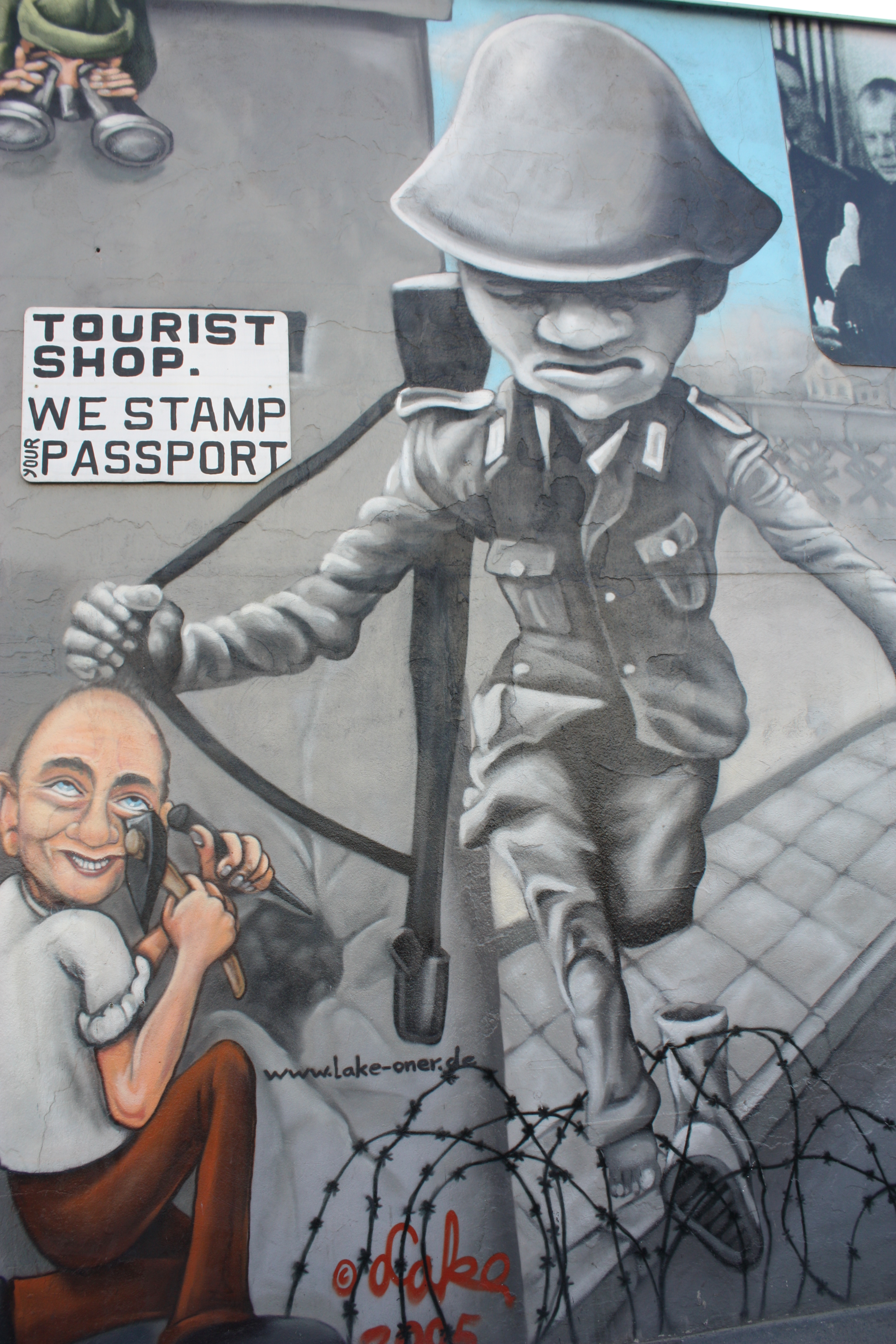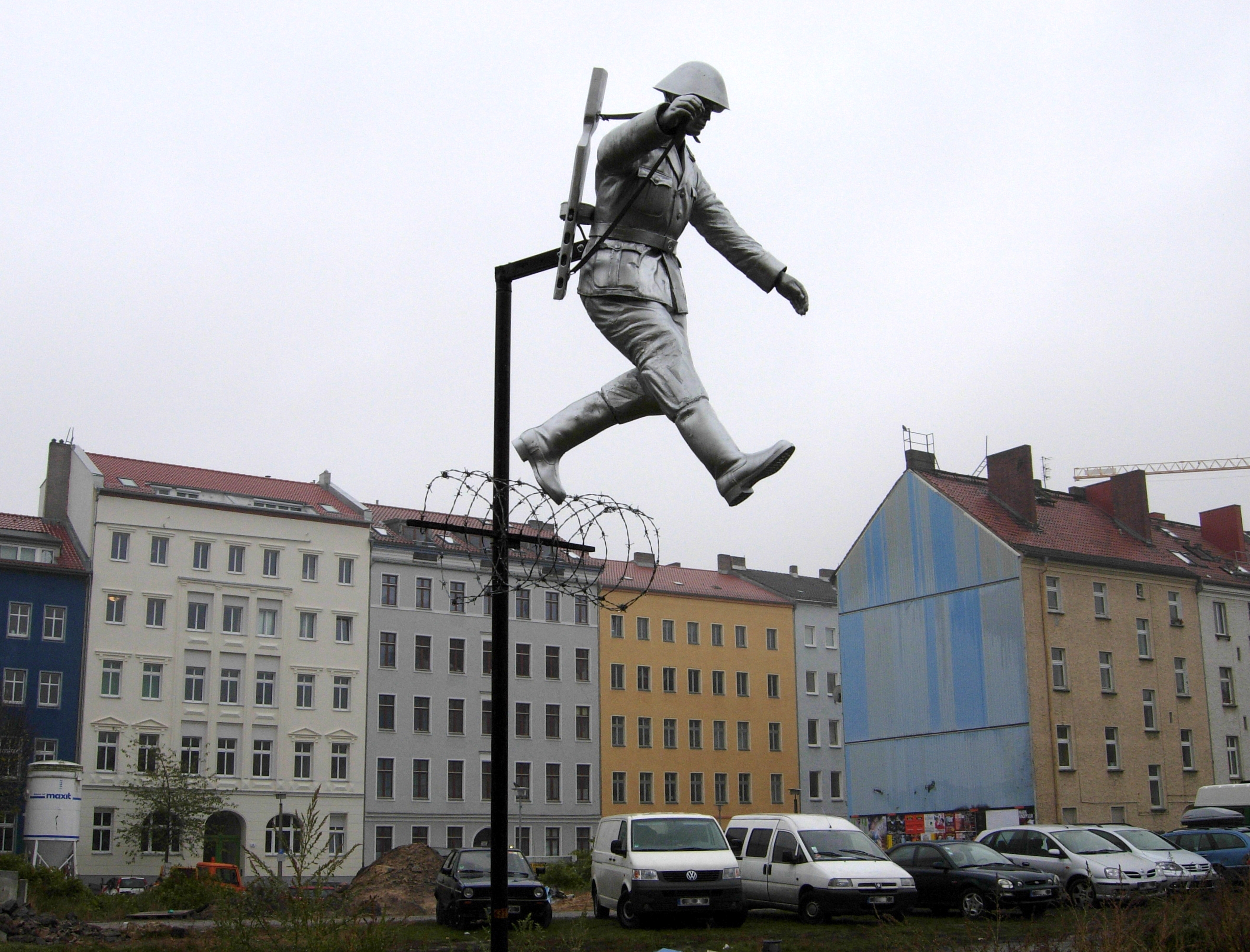Conrad Schumann on:
[Wikipedia]
[Google]
[Amazon]
Hans Konrad Schumann (often anglicized to Hans Conrad Schumann in English-language sources; 28 March 1942 – 20 June 1998) was an
 During his time in West Germany, Schumann feared that the Stasi would try to assassinate him, but this never happened.
After the fall of the Berlin Wall Schumann said, "Only since 9 November 1989 he date of the fallhave I felt truly free." Even so, he continued to feel more at home in Bavaria than in his birthplace, citing old frictions with his former colleagues, and was even hesitant to visit his parents and siblings in
During his time in West Germany, Schumann feared that the Stasi would try to assassinate him, but this never happened.
After the fall of the Berlin Wall Schumann said, "Only since 9 November 1989 he date of the fallhave I felt truly free." Even so, he continued to feel more at home in Bavaria than in his birthplace, citing old frictions with his former colleagues, and was even hesitant to visit his parents and siblings in
 A sculpture called ''Mauerspringer'' ("Walljumper") by Florian and Michael Brauer and Edward Anders can be seen close to the site of the defection, but has since been moved to the side of a building on Brunnenstraße, several meters south of Bernauer Straße.
A sculpture called ''Mauerspringer'' ("Walljumper") by Florian and Michael Brauer and Edward Anders can be seen close to the site of the defection, but has since been moved to the side of a building on Brunnenstraße, several meters south of Bernauer Straße.
East German
East Germany, officially the German Democratic Republic (GDR; german: Deutsche Demokratische Republik, , DDR, ), was a country that existed from its creation on 7 October 1949 until its dissolution on 3 October 1990. In these years the state ...
border guard who escaped to West Germany
West Germany is the colloquial term used to indicate the Federal Republic of Germany (FRG; german: Bundesrepublik Deutschland , BRD) between its formation on 23 May 1949 and the German reunification through the accession of East Germany on 3 O ...
during the construction of the Berlin Wall in 1961.
Early life
Born in Zschochau (now part of Ostrau, Saxony) during World War II, Schumann enlisted in the East German Grenzpolizei (border police) following his 18th birthday. After three months' training inDresden
Dresden (, ; Upper Saxon: ''Dräsdn''; wen, label= Upper Sorbian, Drježdźany) is the capital city of the German state of Saxony and its second most populous city, after Leipzig. It is the 12th most populous city of Germany, the fourth ...
, he was posted to a non-commissioned officers' college in Potsdam
Potsdam () is the capital and, with around 183,000 inhabitants, largest city of the German state of Brandenburg. It is part of the Berlin/Brandenburg Metropolitan Region. Potsdam sits on the River Havel, a tributary of the Elbe, downstream o ...
, after which he volunteered for service in Berlin.
Escape to West Germany
On 15 August 1961, the 19-year-old Schumann was sent to the corner of Ruppiner Strasse andBernauer Strasse Bernauer is a surname. Notable people with the surname include:
*Agnes Bernauer (1410–1435), the commoner wife of Albert III, Duke of Bavaria
* Anna Bernauer (born 1986), Luxembourgish figure skater who competed for her entire career for Luxembou ...
to guard the Berlin Wall on its third day of construction. He and his unit arrived at 4:30 am, where an officer ordered them to take control and protect the border "against the enemies of socialism." Schumann later recalled: "We stood around looking pretty stupid at first. Nobody had told us how that's done: taking control of a border."
At that time and place, the wall was only a single coil of concertina wire
Concertina wire or Dannert wire is a type of barbed wire or razor wire that is formed in large coils which can be expanded like a concertina. In conjunction with plain barbed wire (and/or razor wire/tape) and steel pickets, it is most ofte ...
. Throughout the day, as Schumann paced ten steps up and down, West Berlin
West Berlin (german: Berlin (West) or , ) was a political enclave which comprised the western part of Berlin during the years of the Cold War. Although West Berlin was de jure not part of West Germany, lacked any sovereignty, and was under mi ...
residents shouted catcalls. "You pigs!" "You traitors!" "You concentration camp guards!"
One scene particularly upset Schumann. A young lady in East Berlin passed a bouquet of flowers over the top of the wire to an older lady in West Berlin, obviously the younger lady's mother, and wished her a happy birthday. The young lady apologized for not being able to visit, then motioned to Schumann and added, "Those eopleover there, they won't let me cross anymore." Schumann started to reconsider whether he really wanted to spend the rest of his working life keeping his fellow citizens imprisoned.
Around noon, a West Berlin crowd of about 1,000 demonstrators approached the wire at Schumann's post. They shouted various slogans, including "''Freiheit'' (Freedom)." Schumann recalled: "Suddenly the mass of people moved toward us like a living wall. I thought: they're going to run over us right away. I was nervous and didn't know what to do. I didn't want to shoot and I wasn't supposed to."
Before Schumann was forced to act, more soldiers arrived in armoured cars and pushed the crowd back with rifles fixed with bayonets.
Schumann started to think that he should leave, especially after trucks arrived with concrete posts and steel plates. Over the next two hours, when no other soldier was watching, he pushed down the same section of wire. West Berlin bystanders started to take notice. One young man came close and Schumann yelled at him "Get back at once", then whispered "I'm going to jump!" The young man alerted the West Berlin police, who arrived with a van.
At roughly 4:00 pm, Schumann jumped over the barbed wire while dropping his PPSh-41 submachine gun, and was promptly driven away in the van by West Berlin police. West German photographer Peter Leibing photographed Schumann's escape. The photograph, entitled "Leap into Freedom", has since become an iconic image of the Cold War era and featured at the beginning of the 1982 Disney film ''Night Crossing
''Night Crossing'' is a 1982 British-American drama film starring John Hurt, Jane Alexander and Beau Bridges. The film is based on the true story of the Strelzyk and Wetzel families, who on September 16, 1979, attempted to escape from East Germa ...
''. The scene, including Schumann's preparations, was also filmed on 16 mm film from the same perspective by camera operator Dieter Hoffmann.
Schumann went from West Berlin to West Germany
West Germany is the colloquial term used to indicate the Federal Republic of Germany (FRG; german: Bundesrepublik Deutschland , BRD) between its formation on 23 May 1949 and the German reunification through the accession of East Germany on 3 O ...
, settling in Bavaria
Bavaria ( ; ), officially the Free State of Bavaria (german: Freistaat Bayern, link=no ), is a state in the south-east of Germany. With an area of , Bavaria is the largest German state by land area, comprising roughly a fifth of the total lan ...
. In 1962, he met and married Kunigunde Gunda in Günzburg
Günzburg (; Swabian: ''Genzburg'') is a town in Bavaria, Germany. It is a ''Große Kreisstadt'' and the capital of the Swabian district Günzburg. This district was constituted in 1972 by combining the city of Günzburg – which had not p ...
. They had a son the following year. Schumann took up a new job at a winery and later at the Audi car factory in Ingolstadt
Ingolstadt (, Austro-Bavarian: ) is an independent city on the Danube in Upper Bavaria with 139,553 inhabitants (as of June 30, 2022). Around half a million people live in the metropolitan area. Ingolstadt is the second largest city in Upper Ba ...
, where he worked for nearly 30 years.
Later life and death
Saxony
Saxony (german: Sachsen ; Upper Saxon: ''Saggsn''; hsb, Sakska), officially the Free State of Saxony (german: Freistaat Sachsen, links=no ; Upper Saxon: ''Freischdaad Saggsn''; hsb, Swobodny stat Sakska, links=no), is a landlocked state of ...
. When he returned to East Germany after the reunification
A political union is a type of political entity which is composed of, or created from, smaller polities, or the process which achieves this. These smaller polities are usually called federated states and federal territories in a federal governm ...
to visit his relatives, he was rejected by them. They saw him as a traitor who abandoned his family.
On 20 June 1998, suffering from depression, he committed suicide, hanging
Hanging is the suspension of a person by a noose or ligature around the neck.Oxford English Dictionary, 2nd ed. Hanging as method of execution is unknown, as method of suicide from 1325. The ''Oxford English Dictionary'' states that hanging ...
himself in his orchard near the town of Kipfenberg
Kipfenberg is a town and municipality in the district of Eichstätt in Bavaria, Germany. It is known for its hillside castle and fortress, and for being the geographical centre of Bavaria. The river Altmühl flows through the municipality and its ...
in Upper Bavaria
Upper Bavaria (german: Oberbayern, ; ) is one of the seven administrative districts of Bavaria, Germany.
Geography
Upper Bavaria is located in the southern portion of Bavaria, and is centered on the city of Munich, both state capital and seat o ...
. His body was found by his wife a few hours later.
In May 2011, the photograph of Schumann's "leap into freedom" was inducted into the UNESCO
The United Nations Educational, Scientific and Cultural Organization is a specialized agency of the United Nations (UN) aimed at promoting world peace and security through international cooperation in education, arts, sciences and culture. It ...
Memory of the World programme as part of a collection of documents on the fall of the Berlin Wall.
Monument
 A sculpture called ''Mauerspringer'' ("Walljumper") by Florian and Michael Brauer and Edward Anders can be seen close to the site of the defection, but has since been moved to the side of a building on Brunnenstraße, several meters south of Bernauer Straße.
A sculpture called ''Mauerspringer'' ("Walljumper") by Florian and Michael Brauer and Edward Anders can be seen close to the site of the defection, but has since been moved to the side of a building on Brunnenstraße, several meters south of Bernauer Straße.
Literature
* Christoph Links: Schumann, Konrad. In: ''Wer war wer in der DDR? 5. Ausgabe. Band 2'', Ch. Links, Berlin 2010, .See also
* List of Soviet and Eastern Bloc defectorsReferences
External links
* {{DEFAULTSORT:Schumann, Conrad 1942 births 1998 deaths People from Riesa Suicides by hanging in Germany East German defectors Berlin Wall Black-and-white photographs National People's Army personnel East German emigrants to West Germany People notable for being the subject of a specific photograph 1961 works 1961 in art 1960s photographs 1998 suicides Military personnel from Saxony